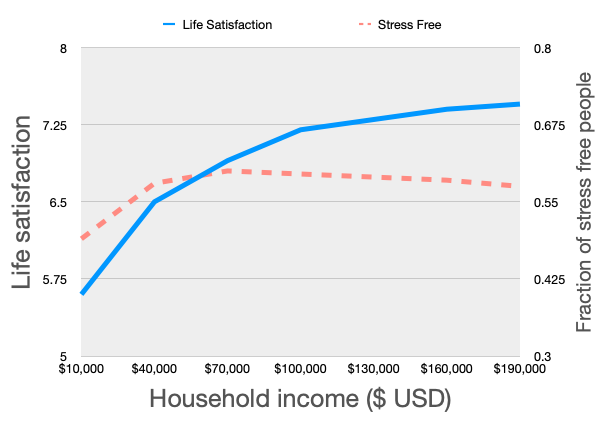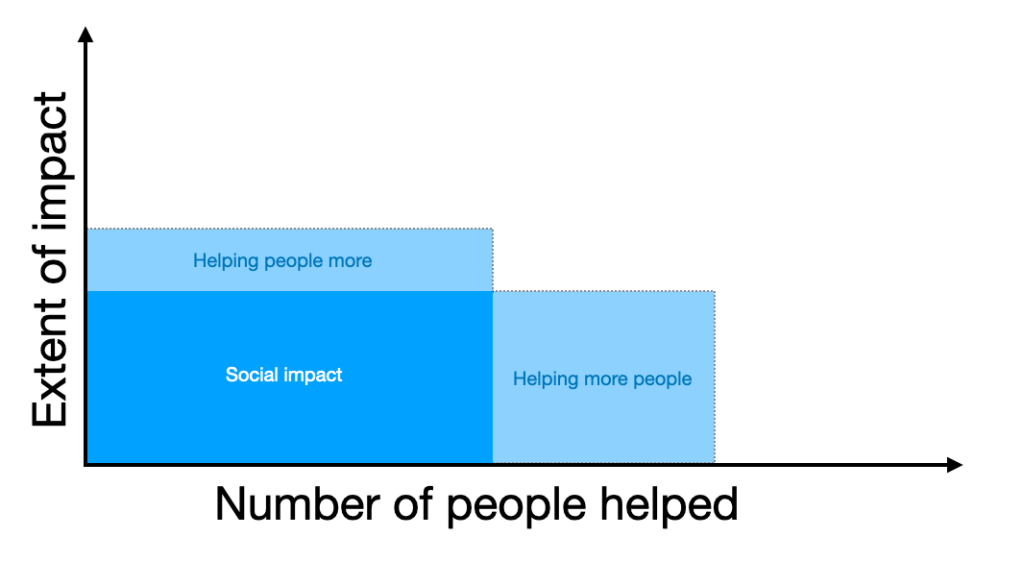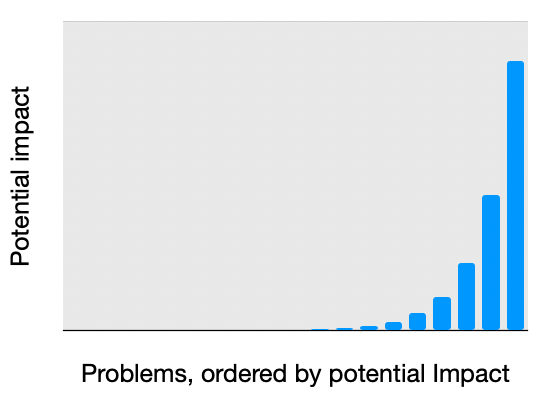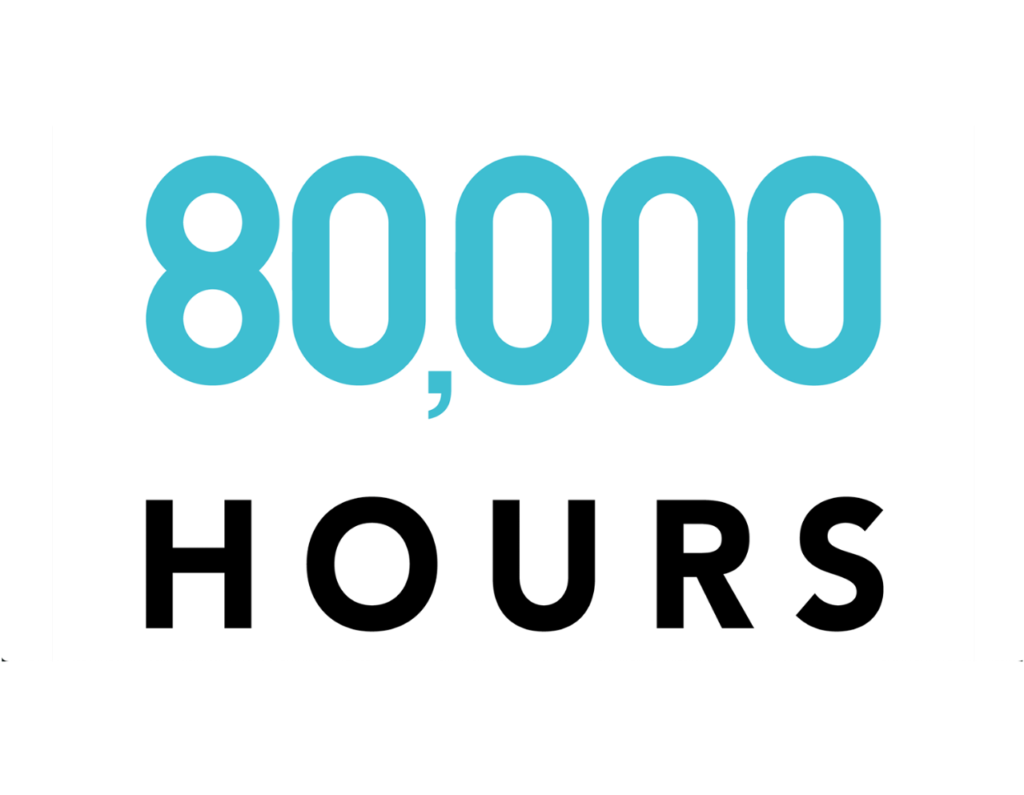Recently, a friend and I stumbled on a non-profit called 80,000 Hours which aims to help people find careers that maximize their social impact on the world. We all have about 80,000 hours in our career (2000 hours per year x 40 years), which is a lot of time to do good if we choose. We spend a large portion of our lives at work which makes it an ideal area to focus on positive change. This organization summarizes the most relevant research on what it means to make a social impact, the highest impact careers, and which problems need the most support. Their research-backed advice is effective as the careers and paths with the greatest social impact are often not intuitive. In this post, I aim to provide a brief summary of their material with the hope that it may prove useful to readers.
This post is a simplification of the 80,000 Hours resources. If this summary interests you, I highly recommend checking out the career guide, research, and other great content on their website.
80,000 Hours is intended for people early in their career, but could also be helpful for anyone who wants to maximize the good they can do with their work. Here, social impact is defined here as the number of people whose lives are improved and how much the lives are improved by.
In a world that is as connected as it is today, we are at an ideal time to help others who need it the most. This is especially true for those of us who live in developed countries where advantages like education, access to resources, and relatively high income are prevalent.
People often focus on the wrong things when looking for an ideal career to maximize their life satisfaction. Many people choose their job based on gut instinct and aim for high pay with low stress. However, research shows that life satisfaction increases only slightly with higher income and stress remains about even beyond a certain point. While more money may make us happier, there is diminishing return.

So, if we really want to increase our life satisfaction, what should we care about?
-
- Work that is engaging. Do you have freedom in your work? Are tasks clear and varied? Do you get feedback on your performance?
- Work that helps others. Studies have been done that show we are much happier when we focus on being of service to others 2 3
- Work you’re good at. You can leverage your skills for other components of a fulfilling career (e.g. pay, more freedom, etc.)
- Work with supportive colleagues. It’s important that you get along with your colleagues and can get support from them when needed.
- Few or no major drawbacks. Avoid things like long hours, unfair pay, instability, or other factors that can make you miserable
- Work that fits with the rest of your life. Can you still do the things you want outside of work (e.g. spending time with family, volunteering, sports, side projects, etc.)
We will be focusing on work that helps others. Not only will it make your life better, but it can also improve the lives of countless others. How we make a difference also really matters because your maximum potential is dependent on where you choose to focus. For example, becoming a family doctor in a country with an abundance of practitioners has a smaller potential impact than working with an organization to provide clean drinking water to a developing country. The main two ways to improve social impact are to help more people or to help those people more. Investing time to think about this now can have a massive difference over the course of a 40 year career.

If you’re happy with your current job, or just really don’t want to change, there are still ways to help others in a meaningful way. The first option we often think of is to volunteer in our community. However, in many cases, volunteering is not the most effective use of our time. For example, a lawyer or high income earner standing at a Salvation Army Christmas kettle is likely to get fewer donations than they could have earned in that time. That doesn’t mean there isn’t value in volunteering, it just means that we should ask ourselves what our objectives are. If we truly want to maximize our impact and reduce suffering, there may be more effective ways to provide support.
You’re likely reading this in a developed country where you’re close to the top 1% of income earners globally4. This means that your money can go a long way in poorer developing countries. If you love your job but want to make a big impact, you could consider donating 10% or more of your income to Give What We Can or another high-impact charity.
Here are three ways to make an impact without leaving your job:
- Donate 10% of your earnings to effective charities. It’s been shown that the right charities can save a life for as low as $50005.
- Advocate for effective solutions to problems. Developed countries have a disproportionate impact on change in the world. Advocating for and supporting the right policies can go a long way.
- Help other to be more effective. Encourage people you know to donate to effective charities, spread knowledge, or find someone already making an impact and find ways to support them.
If you want to choose an effective area to focus your career on, it’s important to consider the potential extend of your contributions. The area you choose will ultimately determine the maximum impact you can have.
Here are four questions to ask about a problem area to evaluate your possible impact:
- Is the problem big in scale? If it was solved, how many people would be helped, by how much, and for how long?
- Is the problem neglected? The problems you know about likely already have a lot of resources which means it will be more difficult to have a big impact due to diminishing return. Neglected problems have a lot of low hanging fruit.
- Is the problem solvable? Is there evidence that progress is possible? Is there a small but realistic chance of making a massive impact?
- What is your personal fit? Can you see yourself becoming good in this area if you worked at it?
The problems you can make the biggest difference with likely aren’t what first come to mind. People may think of climate change, homelessness, or cancer as causes needing support. While these are problems that need to be solved, they are complex with lots of resources already dedicated to solving them. As we’ve mentioned, the money you earn could go a long way in a developing country. Many of the problems in developing countries aren’t as complex and are just limited by resources. Over 1% of people still die from Malaria6, poor emissions regulations in India and China cause widespread respiratory illnesses7, and too few people are working to prevent an AI-related catastrophe8 to name a few neglected areas. By choosing the right problem, you can have exponential influence on helping others.

Another way to increase you impact in a field is to first build up your career capital. Career capital is anything that puts you in a position to make a bigger difference in the future. As Abraham Lincoln said, “If I had eight hours to chop down a tree, I’d spend the first six of them sharpening my axe.” It can be tempting to start working on a problem right now, especially if it seems urgent and you are eager. However, you might want to consider first building up the needed resources so your impact can be bigger down the road.
Here are five ways to develop career capital:
- Skills and knowledge. Ask “what do I need to know and where will I learn the fastest”? This may mean finding a job that has a neutral social impact, but offers the chance to develop relevant knowledge and skills.
- Connections. Who can you meet and work with that will help with your future goals? Joining the right communities can be a great way to build connections.
- Credentials. What can you show to demonstrate competency in an area? These don’t need to be formal but could include a degree, a portfolio, a website, or references.
- Character. What traits can you cultivate that will help people and the world around you? Characteristics like compassion, gratitude, sound judgement, and trust will always be beneficial and are all traits that can be developed.
- Financial runway. How much money can you save to deploy later? If you don’t know how you want to be of service, saving your money until you figure it out can be a good idea.
Going through these tips and questions can help provide a better sense of what you can do to have an effective social impact. In addition to these tools, it is also important to surround yourself with the right people. It’s generally thought that we become like the people we spend most of the time with. If you are serious about maximizing the good you can do, then it’s worth seeing what communities you can join or reaching out to people you know that are already doing good. The reverse is also true; if you change for the better, you’re likely to make an impact on the people that you spend time with.
The world is a big place with a lot of areas that need help. We know that it can feel paralyzing at times to be a single person in the face of so many problems. However, we’re also in a time that has never existed before with countless ways to be of service. We live in a global community where our resources can be use incredibly effectively for those in the greatest need. To see the world change, it has to start with us. Let us remember the enduring words of Gandhi and “be the change you want to see in the world.”
For more information like how to choose the right career from a list of options or to learn more about the most pressing problems, check out the 80,000 Hours Website.
Sources
- Kahneman, Daniel. “High Income Improves Evaluation of Life but Not Emotional Well-Being.” Proceedings of the National Academy of Sciences, National Acad Sciences, web.archive.org/web/20160305061814/www.pnas.org/content/107/38/16489.full. Accessed 26 Dec. 2023. ↩︎
- Titova, MIlla, and Kennon Sheldon. “Happiness Comes from Trying to Make Others Feel Good, Rather than Oneself.” Research Gate, Mar. 2021, www.researchgate.net/publication/349922479_Happiness_comes_from_trying_to_make_others_feel_good_rather_than_oneself. ↩︎
- “Giving and Happiness.” Giving What We Can, www.givingwhatwecan.org/en-CA/get-involved/giving-and-happiness. ↩︎
- https://www.givingwhatwecan.org/how-rich-am-i ↩︎
- “How We Produce Impact Estimates.” GiveWell, www.givewell.org/impact-estimates#Impact_metrics_for_grants_to_GiveWells_top_charities. Accessed 26 Dec. 2023. ↩︎
- Roser, Max. “Causes of Death Globally: What Do People Die From?” Our World in Data, 25 Aug. 2023, ourworldindata.org/causes-of-death-treemap. ↩︎
- Daba C, Debela SA, Atamo A, Desye B, Necho M, Tefera YM, Yeshanew F, Gebrehiwot M. Prevalence of occupational respiratory symptoms and associated factors among industry workers in Ethiopia: A systematic review and meta-analysis. PLoS One. 2023 Jul 13;18(7):e0288238. doi: 10.1371/journal.pone.0288238. PMID: 37440513; PMCID: PMC10343155. ↩︎
- Hilton, Benjamin. “Preventing an AI-Related Catastrophe – Problem Profile.” 80,000 Hours, 22 Dec. 2023, 80000hours.org/problem-profiles/artificial-intelligence/. ↩︎

